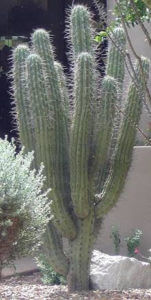Stetsonia coryne is the Plant of the Month!
Stetsonia coryne, Argentine toothpick cactus, Toothpick cactus, cactus
The distinctive, night-blooming cactus grows thirty feet tall and ten to fifteen feet wide. Its columnar, grayish-green stems are approximately four inches in diameter with toothpick-like, grayish-white spines, protruding from the plant. Its stems develop eight or nine rounded ribs with shallow grooves. The cactus grows at a moderate rate and produces many arms at maturity. In late spring to early summer, showy, white blossoms with gray edges open at night and close during the day. In late winter, the cactus develops a tangy, lemon-flavored fruit with black seeds. The white pulp and seeds are not very sweet, but the entire fruit can be eaten if it is cooked. The Argentine toothpick is hardy to eighteen degrees Fahrenheit. It likes full sun, reflected heat and sandy, well-draining soil. The cactus is drought-resistant but prefers occasional irrigation during the hot, dry summer. The Argentine toothpick cactus is considered to be a monotypic taxon. This means it is the only species in the genus Stetsonia. This is a great accent plant to use in cactus and succulent gardens and as a focal point. Use this specimen cactus in raised planters, among boulders, and in attractive containers. It also looks good up against a tall white or light colored wall with its interesting growth habit and bold silhouette. It is native to the low, northwest deserts of Argentina and Bolivia.


